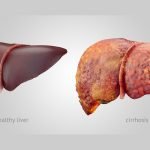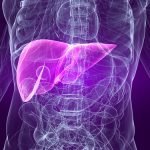You probably don’t spend as much time thinking about your liver as you do about other body parts. For example, you may consider undertaking an activity or eating a particular food because it is good for your heart, whereas it’s likely that the only time your liver might be on your agenda is if you’ve been drinking a lot of alcohol. But the liver is an incredibly important organ, which functions as a clearinghouse of sorts that filters and removes all types of toxins from the body, way more than just alcohol. Therefore, it comes as very good news that new research suggests you can benefit the health of your liver simply by filling your mug with herbal tea or, to a lesser degree, coffee in the morning.
The study, which took place at Erasmus University Medical Center in Rotterdam, The Netherlands, found that drinking herbal tea or coffee on a daily basis may help prevent liver fibrosis, a potentially serious disease.1 Alferink, Louise J.M.; et al. “Coffee and herbal tea consumption is associated with lower liver stiffness in the general population: The Rotterdam study.” Journal of Hepatology. 1 June 2017. Accessed 10 June 2017. http://www.journal-of-hepatology.eu/article/S0168-8278(17)30147-2/fulltext This was based on an analysis of extensive data collected for 2,424 subjects in the Rotterdam Study, a large, long-term investigation. The participants were all 45 or older and residents of the Rotterdam area.
Each of the volunteers had physical examination that included taking blood samples and liver imaging with multiple scanning methods. Additionally, they answered questionnaires about their eating habits, which requested detailed information on their tea and coffee consumption. The researchers differentiated between drinking herbal, green, or black tea, as well as dividing the subjects into the categories of tea drinker or non-tea drinker. Coffee was broken down into categories of no consumption, moderate consumption of zero to three cups a day, and frequent consumption of more than three cups daily.
Interestingly, herbal tea was the only type of tea that was associated with less scarring and stiffness of the liver. What’s more, only one cup a day was enough to offer this protective benefit. Coffee was equally advantageous to herbal tea, but the subjects required a much higher intake. The lower levels of liver stiffness only appeared in those who reported frequent consumption, meaning a minimum of four cups every day.
These results remained intact whether or not the volunteers had fat accumulation in the liver, which is typically a sign of liver disease. In addition, a number of influencing factors were controlled for, including metabolic rates, lifestyle behaviors, and environmental dynamics, and liver fibrosis was still less prevalent in the herbal tea and frequent coffee drinkers. This is important news considering liver fibrosis often progresses into cirrhosis, which can be a lethal disease that involves permanent scarring and eventual failure of the liver.
Both tea and coffee are rich in antioxidants and have been shown to help protect against conditions including Alzheimer’s disease, prostate cancer, and heart disease. And coffee was shown in a 2014 study at the National Cancer Institute in Bethesda, Maryland to prevent the elevation of abnormal enzyme levels that indicate liver damage.2 Xiao, Qian; et al. “Inverse associations of total and decaffeinated coffee with liver enzyme levels in NHANES 1999-2010.” Hepatology. 30 October 2014. Accessed 11 June 2017. http://www.ncbi.nlm.nih.gov/pmc/articles/PMC4245376/. But while coffee and tea may both be beneficial to your health, coffee comes with far more problems. That’s not to say if you prefer coffee that you shouldn’t enjoy a cup sometimes in the morning, but the four cups a day it would take you to achieve the benefits shown to the liver in the current study may also come with side effects.
Coffee is high in caffeine, so unless you complete all of your coffee drinking by 2pm, you may be risking poor quality sleep, and the study didn’t specify whether decaffeinated coffee offers equal liver protection. In addition, other potential hazards of overindulgence in coffee include nervousness, nausea, increased heart rate, and headaches.
Herbal tea, on the other hand, appears to achieve the same level of liver protection in just a single cup a day. And herbal teas are naturally caffeine-free, so you are not risking the negative effects of coffee. So if you’re interested in maintaining a healthy liver for years to come, keep alcohol consumption to a minimum, eat a nutritious diet, add a daily cup of herbal tea to your routine, and help your liver function optimally with a detox. And one final note. The study didn’t differentiate what kind of herbal tea provides the best protection for the liver—but Jon Barron does.
References
| ↑1 | Alferink, Louise J.M.; et al. “Coffee and herbal tea consumption is associated with lower liver stiffness in the general population: The Rotterdam study.” Journal of Hepatology. 1 June 2017. Accessed 10 June 2017. http://www.journal-of-hepatology.eu/article/S0168-8278(17)30147-2/fulltext |
|---|---|
| ↑2 | Xiao, Qian; et al. “Inverse associations of total and decaffeinated coffee with liver enzyme levels in NHANES 1999-2010.” Hepatology. 30 October 2014. Accessed 11 June 2017. http://www.ncbi.nlm.nih.gov/pmc/articles/PMC4245376/. |












Superliked the way of
Superliked the way of expressing your thoughts, the post is one of the best articulated article I have read in last couple of months. Keep up the good work, I am adding your website as one of the favorite sites.
Unlike the previous comment I
Unlike the previous comment I would say this is one of the most useless article posted on this side. There is no such thing as “THE herbal tea”. Tisanes can be done from thousands and thousands of different herbs. Add combination of the latter + variation in preparation and the combinations are literally infinite.
Including herbs known to have negative effect on liver health!
So unless the specific herbs found beneficial in the study are mentioned this claim is meaningless!
Then the article proceeds by mentioning “Both tea and coffee are rich in antioxidants” apparently referring to the teas made from Camellia Sinensis, the only herb, considered non-herbal when made into tea 🙂
Needs editing!
No, it’s actually not useless
No, it’s actually not useless. The study itself did not differentiate between the types of herbal tea consumed. If you followed the link (http://www.journal-of-hepatology.eu/article/S0168-8278(17)30147-2/fulltext), you would have seen that participants were asked to identify what beverages they consumed—and herbal tea was only broken down as “no/any.”
“We included participants who underwent transient elastography, ultrasound and completed a food frequency questionnaire. Coffee and tea consumption were categorized into no, moderate (>0–3), or frequent (⩾3) intake (cups/day), and tea further into green, black and herbal tea (no/any).”
And based on only that differentiation, the study concluded.
“In the general population, frequent coffee and herbal tea consumption were inversely related with liver stiffness.”
Now, commonsense says that some herbal teas would be more beneficial to the liver than others. Nevertheless, there was benefit observed across the entire category of herbal teas. That said, if you’re looking for the best herbal tea to benefit the liver, you might want to check out the article cited at the end of the article. https://jonbarron.org/detox/liver-flush-tea. When it comes to the liver, that really is THE tea.
Its a very nice post thanks
Its a very nice post thanks for sharing this post..
My wife and I (both 70+) use
My wife and I (both 70+) use a half teaspoon of NatriumBiCarbonate daily plus >5 mugs of coffee.
Is this a positive or negative situation?